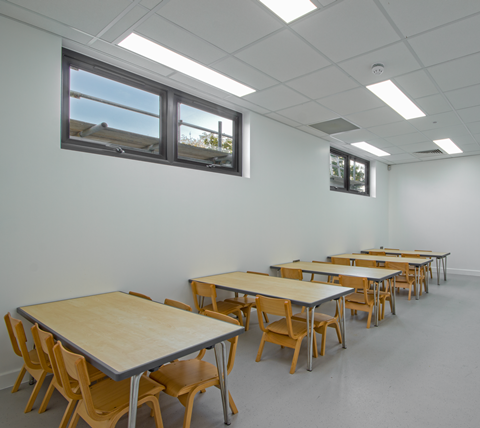Collaborative framework based on MoJ model to be designed to deliver flagship 500-school building programme
The Department for Education is working on a new collaborative contractor framework designed to speed up the delivery of projects under the delayed School Rebuilding Programme.
Separate industry figures said the department has told the sector it plans to create an “Alliance for Learning” framework which is based on the Ministry of Justice’s collaborative £1bn New Prisons Programme Alliance framework.
The decision to press ahead with the project comes after criticism of the slow delivery of the Department for Education’s (DfE) flagship 500-school construction plan, the School Rebuilding Programme (SRP).

Last May, the government admitted that only four schools had been built two years into the programme, next to an anticipated build rate of 50 per annum, with just 24 contracts awarded compared to a forecast figure of 83.
Andrew Dutton, education sector leader at consultant Arcadis, said the planned “Alliance for Learning” framework was being worked up to deliver the principles of the review by David Mosey of public sector construction frameworks, “Constructing the Gold Standard”.
Steve Beechey, group public sector director at contractor Wates, said suppliers had been in discussions with the department over the new framework, also based on the MoJ’s alliancing framework, for more than 18 months.
The comments came as the DfE published an “Early Market Engagement” notice for a new construction framework to operate from 2025, which it said would deliver “both traditional and offsite methods of construction”. It said the framework was designed to replace the now lapsed offsite construction framework and the still current Construction Framework 21. It did not clarify whether this will be definitely the alliancing framework which it has already been discussing with the market, but said it wanted to have an “early engagement with the market to help inform the […] strategy in a collaborative manner”.
While the DfE is yet to publish details of how exactly the alliancing framework will work, the MoJ framework on which it is based has seen four contractors – ISG, Kier, Laing O’Rourke and Wates – collaborate to design a standardised prison, before taking on individual contracts to build separate prisons according to the agreed design.
>> See also How do we fix England’s crumbling school estate?
Dutton said initial discussions have focused around encouraging contractors to work together on larger pipelines of work, thereby allowing them to invest and innovate with confidence.
Building understands that discussions so far have proposed contractor collaboration to design standardised schools for batches of work of anything up to £500m, along the lines of the MoJ framework.
“It’s about collaborating and sharing risk and reward. It’s one of the actions in place to increase the pace of delivery,” Dutton said.
James Stone, director at consultant Gleeds, said work on the framework had paused last year during the RAAC crisis but that the department had now re-confirmed it wanted to proceed. “I think the department realises there’s a lot of knowledge in the contractor community and it needs to engage early in order to get the benefit of that.
“This alliance approach is one that’s welcomed to allow everyone to collaborate around achieving a good end product. This gives contractors more confidence that projects will be delivered, and of the scale and pipeline of work coming through.”
Wates’ Beechey added: “I think the alliancing model has worked really well and we’re really keen to transfer this to schools. We’re really looking forward to the opportunity to be involved in this initiative from the DfE in the near future.”
A report by the National Audit Office last year found that 700,000 children are learning in schools which require major refurbishment, with 38% of school buildings beyond their design life, and nearly one in six built before 1940. It said the school estate was deteriorating, with some buildings posing an “unacceptable” safety risk to students and staff. An average of just £2.3bn was spent on capital projects by the DfE in the five years to March 2023, despite a “best practice” assessment by the department that £7bn per annum was needed.
A spokesperson for the Department for Education declined to comment in detail on the new framework but confirmed that a pilot trialling an alliance approach of working with contractors was being developed, and said more information will be set out in due course..




























No comments yet